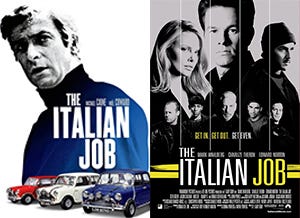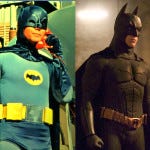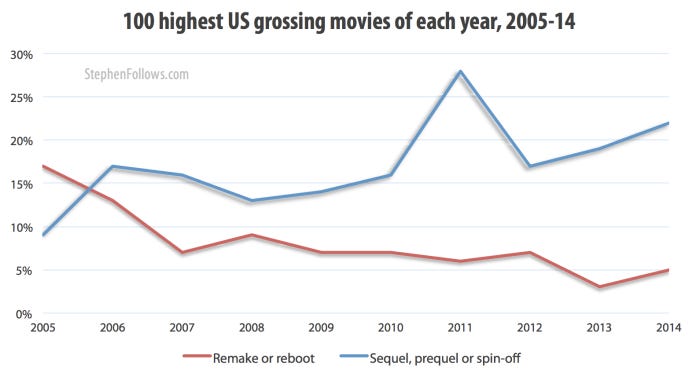The scale of Hollywood remakes and reboots

There a number of clear signs you're getting older; Policemen look younger, music gets louder and more unintelligible and you start complaining more often about "How could they possibly remake that movie?"
Personally, I think part of the outcry against any upcoming Hollywood remake is in fact misplaced anxiety about the passage of time and the ever-closer creeping inevitability of death, but I guess that's a debate for a different blog. While you're still around to complain, would you like to see the stats on Hollywood remakes? 'Course you would...
The percentage of Hollywood remakes has been falling over the past decade
In 2005, 17% of top grossing films were Hollywood remakes but by 2014 it was just 5%
The fourth horror film ever made was a remake of the first horror film
29% of top grossing Hollywood horror movies are remakes, 2005-14
Very few Hollywood dramas or romantic comedies are remakes (2.7% and 3.4% respectively during 2005-14)
The Scorpion King is a 2002 spinoff of the 2001 prequel to the 1999 remake of a 1932 film.
The case for Hollywood remakes
Hollywood is constantly on the search for "new ideas" and where better to find those "new ideas" than in movies they've previously made - everything was new once, right? So if you're a cigar-chomping Hollywood exec and you want to breathe new life into an old franchise with the hope of creating a new generation of paying fans then you have a few options...
Direct sequel - Carry on as if the old film series never stopped, such as Indiana Jones and the Crystal Skull and Terminator 3: Rise of The Machines.
"Years Later" sequel - Recognize that time has passed and hand over the baton to a new generation of characters, such as Tron: Legacy and Herbie Fully Loaded.
Remake - Just tell the same story as the previous film, maybe updating Walkmans for iPods, such as You've Got Mail and Ocean's Eleven.
Reboot - Throw out all the existing continuity and re-imagine the characters and world, such as Batman Begins and Casino Royale.
Remake in name only - Take a successful film and copy some of the surface elements while re-writing the characters and world, such as The Italian Job

The idea of remaking a successful movie is about as old as film itself. The fourth horror film ever made, The Haunted Castle, was an English language remake of the first horror film, Le Manoir du Diable, which was a French film made a year earlier in 1896.
There are a number of films you may not realise are Hollywood remakes or reboots, including...
You've Got Mail is a modern (well, modern for 1998) retelling of The Shop Around The Corner from 1940
The Departed is a remake of the incredible 2002 Hong Kong classic Infernal Affairs
Adam Sandler's The Longest Yard is a 2005 remake of a 1974 Burt Reynolds film
The Lake House with Keanu Reeves and Sandra Bullock is a remake of a 2000 South Korean film called Il Mare
Note: Today I'm only measuring official remakes, not films which were clearly borrowed from one another, such as the retelling of Point Break under the title The Fast and The Furious (see here for a comparison).
Hollywood remakes becoming less common
The percentage of top grossing films which are Hollywood remakes or reboots is falling. In 2005, 17 films were Hollywood remakes (including four in the top ten) whereas by 2014 that number had fallen to just five of the top 100 grossing films.


I think many people will be surprised to hear that there are fewer Hollywood remakes than 10 years ago but bear in mind that when a remake is successful then it may spawn other films (sequels, prequels and spinoffs) which won't be classed as remakes or reboots. For example, Batman Begins is a reboot of the Batman franchise, but The Dark Knight and The Dark Knight Rises are just sequels.
Therefore, to get a true picture of Hollywood today we need to combine the data from this week's research on Hollywood remakes / reboots with last week's data on sequels, prequels and spinoffs.

Some films blur the line of sequel / remake / adaption to the point of abstraction...

Aliens vs. Predator: Requiem is a sequel to an adaptation of a comic book which itself was a spinoff of two films.
The Dark Knight Rises is the second sequel to the reboot of a series previously seen on-screen in the 1990s and on TV in the 1960s, both of which were adaptations (and possible reboots) of a comic book series started in 1939.
The Scorpion King is a 2002 spinoff of the 2001 prequel to the 1999 remake of a 1932 film. Oh, and there have since been three straight-to-video sequels to the Scorpion King released in 2008, 2012 and 2015.
Which genre features the highest percentage of Hollywood remakes?
5 points if you guessed horror. In the years 2005, 2006 and 2008 half of all the horror films in the top 100 were Hollywood remakes.

Brace yourself, more are coming

are numerous reports of movie classics which are being developed for Hollywood remakes. Many of these films won't make it to the big screen as Hollywood develops far more scripts than it actually produces. However, as superhero movies go from great to grating, we should expect to see many more Hollywood remakes in the coming years. These include A Prophet, A Star is Born, About Last Night, Agent 47, Akira, All of Me, All Quiet on the Western Front, American Psycho, An American Werewolf in London, Barbarella, Bill and Ted's Excellent Adventure, Cliffhanger, Commando, Death Note, Drop Dead Fred, Escape From New York, Flatliners, Flight of the Navigator, Frankenstein, Gremlins, Headhunters, Heat (not the good one, thank God, this is the Burt Reynolds 1968 film), Highlander, Honey I Shrunk The Kids, IT, Jacob's Ladder, Jumanji, Logan's Run, Mortal Kombat, Overboard, Point Break, Police Academy, Poltergeist, Porky's, Rebecca, Short Circuit, Soapdish, Starship Troopers, The Birds, The Craft, The Crow, The Fantastic Four, The Mummy (yes, again!), The NeverEnding Story, The Orphanage, The Seven Samurai, The Wild Bunch, Three Men and a Baby, Time Bandits, Timecop, Tomb Raider, Van Helsing, Videodrome, Wargames, Waterworld, Weird Science, Wild Bunch and xXx to name but a few.
Notes
When I decided to look at originality in Hollywood movies I didn't think that the hardest topic would be Hollywood remakes. Some of the topics which came up include...
What is a remake? For the purposes of this research I decided to be generous to Hollywood on the subject of remakes. If a film was a remake of a TV show I did not classify it as a 'remake' (just an 'adaptation'). For some shows, such as Sex and The City and The Simpsons it's obvious as it's only the characters and their world which have moved over to the big screen. However, it's a closer call for projects such as the 2009 mediocre film 'State of Play'. It was based on the terrific 2001 six-part BBC drama of the same name and contains the same basic events (save for a location change and bringing minor details into the current age). It could be argued that this makes the 2009
mistakefilm a remake but for these stats I have gone with the stricter definition of remake to mean 'remake of an existing feature film'.Is a new adaptation a remake? If the original film was itself an adaptation then the new film could be regarded as a remake of the previous film or as a new adaptation of the original source material. In these cases, I researched the lineage of the new project and tried to determine if it went back to the source material or the previous film adaptation. So for films like the 2005 film War of The Worlds and 2012's Total Recall I did not class them as Hollywood remakes, just adaptations (from HG Wells' 1897 serialized novel War of The Worlds and Philip K. Dick's 1996 short story We Can Remember It for You Wholesale, respectively).
When is a remake also a reboot? In theory, the line between a remake and a reboot is clear. A remake is specifically based on an existing film whereas a reboot takes an established canon of work, throws out much of the continuity to start from the beginning again. Clear examples of each would be the shot-for-shot remake of Psycho made by Gus Van San in 1998 and the 2014 Godzilla reboot which changed the creature from villain to hero. However in practice, the line can be vague. For example, many people at the time referred to the 2012 Total Recall film as a 'reboot' but with hindsight we can see that it was more of a remake (or new adaptation, as detailed above).
Epilogue
What started out as a single article on originality in Hollywood ballooned into three and yet I still don't feel fully sated. When measuring originality it's not enough to simply look at the lineage of the script or characters. Unfortunately this is all that I can do at this stage but hopefully the day will come when I can command a fully intelligent AI and force it to read 1,000s of scripts to objectively measure the creativity therein. Of course, the worry then would be that reading so many Hollywood blockbuster screenplays would either diminish its faculties or cause it to lose its newly-found will to live. Ah well, that's a problem for future me.


